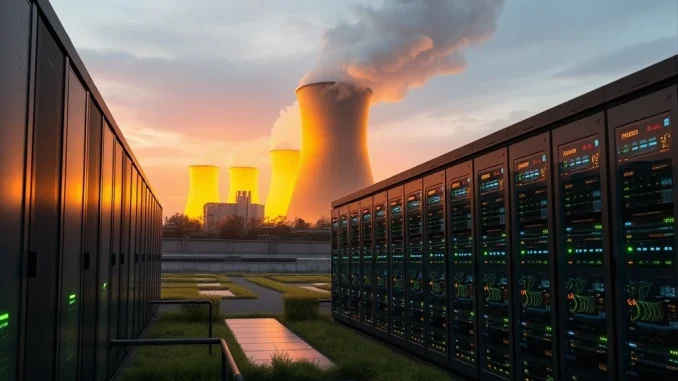
Imagine a world where the energy that would otherwise go to waste is harnessed to power the digital future. This isn’t science fiction; it’s a potential reality unfolding in France, where lawmakers are proposing a groundbreaking bill to utilize the nation’s surplus nuclear energy for Bitcoin mining. This ambitious move could not only bolster France’s economy but also redefine the narrative around Bitcoin’s energy consumption.
Bitcoin Mining Meets French Ingenuity: A Bold Proposal
French lawmakers have recently put forward a compelling bill that outlines a five-year pilot program aimed at channeling the country’s excess nuclear energy directly into Bitcoin (BTC) mining operations. According to reports from CryptoSlate, this innovative initiative isn’t just about energy efficiency; it’s also a significant economic play. Proponents estimate that this program could generate an impressive $150 million in annual revenue. This isn’t merely a theoretical concept; it’s a tangible plan to transform an abundant, clean energy source into a consistent revenue stream, leveraging the computational power required for secure blockchain operations.
The proposal highlights several key aspects:
- Pilot Program Duration: A five-year trial period to assess the feasibility, economic impact, and environmental benefits.
- Energy Source: Specifically targets surplus nuclear energy, which is often curtailed or wasted during off-peak hours or when demand is low.
- Revenue Projection: An estimated $150 million in annual earnings, signaling a potentially lucrative venture for the state.
- Strategic Alignment: Positions France at the forefront of sustainable and economically beneficial cryptocurrency integration.
Why Nuclear Power Bitcoin is a Game-Changer for Energy Efficiency
France boasts one of the highest proportions of nuclear power in its energy mix globally, making it a unique candidate for this kind of initiative. While nuclear energy is a reliable and low-carbon source, managing its output to match fluctuating demand can be challenging. This often leads to situations where nuclear plants produce more electricity than the grid can absorb, resulting in ‘surplus’ energy. Instead of letting this valuable, clean power go to waste, the proposed bill suggests a brilliant solution: direct it to energy-intensive Bitcoin mining facilities.
This approach transforms a liability (excess energy) into an asset (revenue-generating Bitcoin mining). It’s a win-win scenario that addresses both energy waste and the growing demand for sustainable cryptocurrency operations. By providing a consistent and stable load for nuclear power plants, Bitcoin mining can actually help stabilize the grid, making the overall energy system more efficient and resilient. This synergy between nuclear power and digital currency could serve as a model for other nations with similar energy infrastructures.
What This Means for France Crypto Leadership
If enacted, this bill could significantly elevate France’s standing in the global crypto landscape. By proactively embracing Bitcoin mining with a focus on sustainability, France could attract more blockchain innovation and investment. This isn’t just about mining revenue; it’s about establishing a regulatory framework that fosters growth while adhering to environmental principles. Such a move could:
- Boost Economic Growth: Create new jobs in the energy and tech sectors, from facility construction to operations and maintenance.
- Enhance Energy Security: Provide an economic incentive to maintain and optimize nuclear infrastructure.
- Improve Global Image: Position France as a leader in green tech and responsible digital asset development, contrasting with narratives of Bitcoin’s high energy consumption.
- Attract Talent and Investment: Lure cryptocurrency companies and developers looking for stable, sustainable, and regulated environments.
This proactive stance demonstrates a forward-thinking approach to integrating emerging technologies with national infrastructure, potentially making France a hub for sustainable blockchain development.
The Energy Bitcoin Nexus: A Global Trend Towards Sustainability?
The French proposal isn’t an isolated incident but rather a significant step within a broader global trend. As the world grapples with climate change and energy efficiency, more regions are exploring innovative ways to power Bitcoin mining using otherwise stranded or underutilized energy sources. We’ve seen examples of Bitcoin miners using flare gas from oil fields in the U.S., geothermal energy in Iceland, and hydroelectric power in various regions.
This French initiative, however, stands out due to its scale and the specific use of surplus nuclear energy. It highlights a critical shift: instead of viewing Bitcoin mining as solely an energy consumer, it’s increasingly being recognized as a flexible load that can monetize wasted energy and even help balance power grids. This symbiotic relationship could be crucial for the future of both energy production and the digital economy.
| Benefit Category | Impact of French Bitcoin Mining Bill |
|---|---|
| Economic | Estimated $150M annual revenue; new jobs; investment attraction. |
| Environmental | Utilizes clean, surplus nuclear energy; reduces energy waste; lowers carbon footprint of mining. |
| Energy Grid Stability | Provides a consistent load for nuclear plants; helps balance supply and demand. |
| Global Positioning | Establishes France as a leader in sustainable crypto and green tech. |
Paving the Way for Sustainable Bitcoin’s Future
The conversation around Bitcoin’s energy consumption has long been a contentious one. However, initiatives like the one proposed in France demonstrate a clear path towards a more sustainable Bitcoin ecosystem. By leveraging energy that would otherwise be wasted, and doing so with a low-carbon source like nuclear power, the environmental impact of mining can be significantly mitigated, if not turned into a net positive for grid efficiency.
While challenges remain, including regulatory hurdles, public perception, and the technical complexities of integrating mining operations with large-scale energy infrastructure, the potential benefits are immense. This pilot program could offer invaluable insights into how nations can strategically align their energy resources with the burgeoning digital economy, fostering innovation while promoting environmental responsibility. It’s a testament to the adaptability of Bitcoin mining and the ingenuity of policymakers looking for practical solutions to complex energy challenges.
Conclusion: A Bright Future for Green Crypto?
France’s audacious proposal to power Bitcoin mining with surplus nuclear energy marks a pivotal moment in the ongoing debate about cryptocurrency’s environmental footprint. It’s a bold, pragmatic step that could generate substantial revenue, enhance energy efficiency, and firmly establish France as a pioneer in the sustainable crypto space. As the world continues to seek cleaner energy solutions, integrating Bitcoin mining into existing renewable and low-carbon energy infrastructures presents a compelling and economically viable path forward. This initiative isn’t just about mining; it’s about smart energy management, economic opportunity, and a greener future for digital assets.



